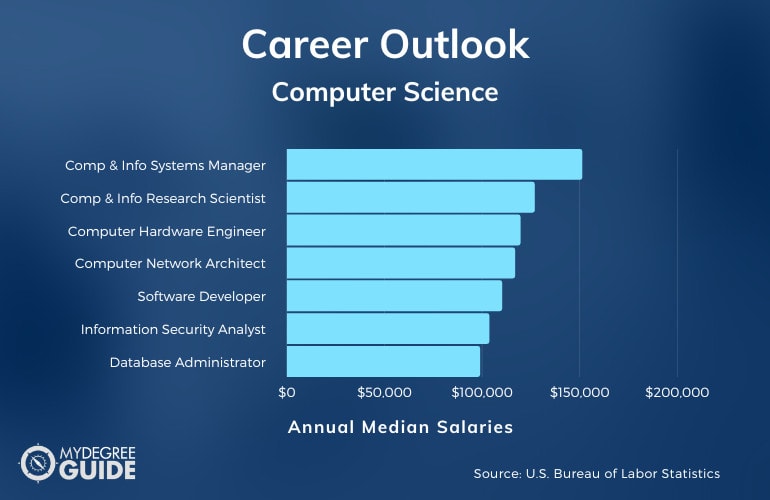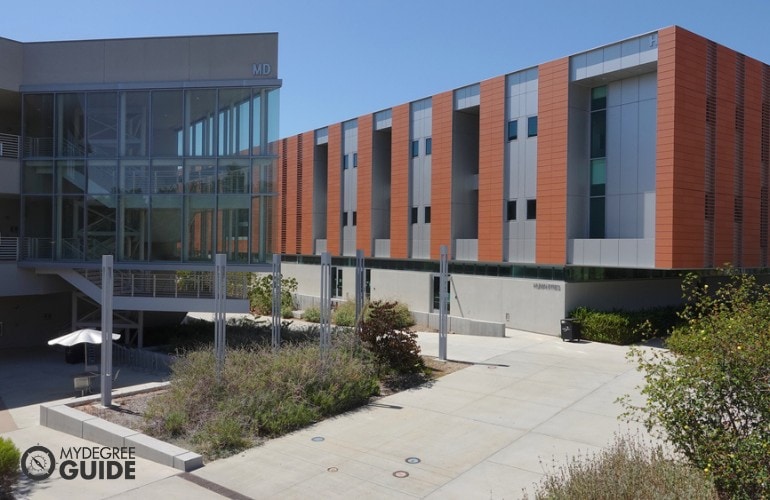Computer science jobs are forecast to grow quickly over the next 10 years, so it’s not surprising that students in a range of fields are wondering if they can find an online masters in computer science for non CS majors.

Computer science masters for non majors are out there, and great jobs may await you upon graduation.
Editorial Listing ShortCode:
People in government and industry know the demand is urgent for a larger and more diverse applicant pool, so programs are emerging to open doors for non computer science majors, in other words, those seeking a masters in computer science without bachelors in computer science degrees.
Universities Offering Online Master’s in Computer Science for Non-CS Major
Methodology: The following school list is in alphabetical order. To be included, a college or university must be regionally accredited and offer a computer science master’s degree online for non-cs major.
Columbia University
Students interested in Columbia University’s computer science masters program must have a 3.3 GPA and must take the GRE.
Students can choose one of eight concentrations, including computer security, computational biology, machine learning, network systems, foundations of computer science, natural language processing, software systems, or vision, graphics, interaction, and robotics.
Columbia is accredited by the Middle States Commission on Higher Education.
Drexel University
Students applying to Drexel University’s Master of Science in Computer Science program don’t have to have undergraduate computer science degrees, but they must have or must take prerequisite courses comparable to foundations of computer science and programming tools and environments.
Concentrations include but aren’t limited to applications, theory, and intelligent systems.
Drexel University is accredited by the Middle States Commission on Higher Education.
Georgia Institute of Technology
Georgia Institute of Technology prefers that students applying for its Master of Computer Science program have an undergraduate degree in a related field, but it’s not required. All students must have a 4 year degree, though. Specializations include computing systems, interactive intelligence, machine learning, and computational perception and robotics.
The Georgia Institute of Technology is accredited by the Southern Association of Colleges and Schools Commission on Colleges.
Johns Hopkins University
Students applying to the Master of Science in Computer Science program at Johns Hopkins University must have or take the following prerequisites: one year of calculus, one semester of advanced math, one semester of Java or C++, one semester of data structures, and one semester of a computer organization course.
Johns Hopkins University is accredited by the Middle States Commission on Higher Education.
Stanford University
Stanford University doesn’t require students entering its computer science masters program to have an undergraduate computer science degree, but they prefer students with strong analytical and quantitative skills.
The curriculum includes classes in algorithmic analysis, computer organization and systems, program analysis and optimizations, software design and logic, and automata and complexity theory.
Stanford University is accredited by the Accrediting Commission for Senior Colleges and Universities of the Western Association of Schools and Colleges.
Stevens Institute of Technology
The Master of Science in Computer Science program at Stevens Institute of Technology is a 100% online program.
It features a curriculum that’s heavy in the most high-demand areas of the technology field, including human and computer interaction, software development, enterprise software design, cloud computing, web programming, and mobile systems and applications.
Stevens Institute of Technology is accredited by the Middle States Commission on Higher Education.
Tufts University
Tufts University offers a Master of Science in Computer Science program that can be completed entirely online in less than 2 years. It includes 10 courses and a 2 semester long capstone project. The curriculum includes courses on programming languages, discrete mathematics, software engineering, networks and protocols, and computer security.
Tufts University is accredited by the New England Association of Schools and Colleges.
University of Illinois – Urbana Champaign
University of Illinois – Urbana Champaign offers a Master of Science in Computer Science program that’s research-oriented, requiring 28 coursework credits and a 4 credit thesis.
Students will take courses in artificial intelligence, graphics and HCI, bioinformatics and computational biology, scientific computing and formal methods, programming languages, and software engineering.
The University of Illinois at Urbana-Champaign is accredited by the Higher Learning Commission.
Worcester Polytechnic Institute
The Master of Science in Computer Science program at Worcester Polytechnic Institute offers an optional concentration in cyber security for students interested in that aspect of computer science.
The program teaches students to understand the mathematical foundations of computing, create algorithms, encode algorithms in software languages, and perform hands-on projects.
Worcester Polytechnic Institute is accredited by the New England Commission of Higher Education.
Wright State University
Wright State University’s online computer science masters program has both a thesis option and a non-thesis option to suit all students’ needs. There are several areas of study in the curriculum, including courses in databases and data mining, data science, machine learning, big data, artificial intelligence, and visualization and analytics.
Wright State University is accredited by the Higher Learning Commission.
Online Master’s in Computer Science for Non CS Majors Programs

For non CS majors with unrelated bachelors, the best online masters in computer science programs are likely to be the ones offering a compact course of study designed to fill critical knowledge gaps.
Some programs may offer bridge courses or a similar pathway forward. You may end up taking more courses than students who already have a CS background. The good news is that these preliminary courses are also an opportunity to explore which concentration you want to pursue.
If you’re trying to get a masters in computer science with no background in computer science, then it may be helpful to consider if you have any certifications or work experience in the field. These might help qualify you for admissions or guide you in picking a concentration.
This field is driven by innovation on numerous fronts, including artificial intelligence, cloud services, cybersecurity, and robotics. You may be able to qualify for many high-demand jobs in the computer science field with just a bachelor’s degree.
If you already have a bachelors with a non CS major, then a computer science masters for non majors likely won’t take you much longer to earn in comparison to going for a second bachelors.
A masters program in computer science offered by an accredited university means you can expect to get an intensive, rigorous, and technically challenging course of study. Your coursework may cover the cutting-edge concepts and methods that are fueling innovations and applications across virtually every industry today.
Computer Science Careers & Salaries

An online masters in computer science gives you more than entry-level qualifications for a number of well-paid careers. It may be helpful to think about which career path you want to take so you can choose a program with concentrations that fit your career goals.
Concentrations include computer hardware and engineering, coding, computer languages, and software development. Others include cybersecurity, advanced theoretical research in computer science and machine learning, cloud technology, data storage, and robotics.
According to the Bureau of Labor Statistics, job candidates with master’s degrees in computer science should have exceptional qualifications for a range of well-paid positions in computer technology, IT management and research, and software development roles.
| Careers | Annual Median Salaries |
| Computer and Information Systems Manager | $151,150 |
| Computer and Information Research Scientist | $126,830 |
| Computer Hardware Engineer | $119,560 |
| Computer Network Architect | $116,780 |
| Software Developer | $110,140 |
| Information Security Analyst | $103,590 |
| Database Administrator | $98,860 |
| Computer Systems Analyst | $93,730 |
| Computer Programmer | $89,190 |
| Network and Computer System Administrator | $84,810 |
Since computers are used across industry sectors, you may find computer-related jobs in diverse work settings. These waves of innovation and the ubiquitous nature of digital connectivity across mobile platforms, media, communications, and transportation systems means you may find abounding opportunities.
The above list of computer science jobs shows just how much demand there is for qualified employees across a range of roles. This masters degree may qualify you to be among today’s most qualified candidates for any number of exciting jobs emerging in the wake of digital innovations and disruptions.
Computer Science Master’s Curriculum & Courses

If you find your way into a computer science masters program, the list below may help you anticipate what advanced computer science studies can look like.
- Overview of Computational Theory: You’ll get an overview of fundamental computer designs and principles as a framework for more concentrated studies and future research possibilities.
- Systems and Network Architectures: You’ll get training in integrated IOT systems and data and communications networks as a foundation for engineering design innovations, cybersecurity applications, and IT management leadership.
- Database Design and Management: You’ll learn about database technologies, features of relational database designs, information security, and machine-learning applications of data management systems.
- Computer Programming: This course gives you advanced knowledge of the most important programming languages and applications as well as an understanding of mathematical and algorithmic analysis for software tools.
- Software Engineering: You’ll learn about software requirements and specifications and about processes for creating new software tools and applications.
- Cybersecurity Methods and Engineering: You’ll get in-depth knowledge of cybersecurity tools and challenges with a focus on related computer and software engineering methods.
- Research Methods: You’ll explore advanced research methods and principles to apply in various applications, depending on course concentration, including engineering research, information science research, and artificial intelligence.
- Mobile Communications: This course covers information system applications in the context of real-time operating systems, wireless networking systems, and emerging 5G challenges and opportunities.
- Artificial Intelligence: You’ll learn advanced software designs and functions for mass data retrieval and automated, data-driven applications.
- Advanced IT Analysis: This course covers core analytical methods for a range of networked communication and information storage systems that support comprehensive IT system design and management.
Courses will vary by school and program, but you may likely find that even programs that support non CS majors will require extensive technical, analytical, and mathematical skills and aptitudes.
Admissions Requirements

Admissions requirements may vary from university to university. As with most online masters programs, though, admissions for a computer science masters online for non CS majors may require the following:
- Undergraduate degree: Either a Bachelor of Arts or Bachelor of Science degree is often required.
- Prerequisites: Some prescribed or prerequisite math and science courses may be required.
- Test scores: GRE or GMAT scores may or may not be required, depending on the school.
Some schools may mostly be interested in non CS majors who have a bachelors in a related field, such as specific engineering or math concentrations.
Schools offering more comprehensive bridge programs may be designed to recruit applicants from all backgrounds and academic majors. In any event, your admissions may at some point hinge on your ability to demonstrate mathematical proficiencies and analytical thinking skills.
If you are seeking a masters in computer science without CS undergrad, some admissions offices may also be interested in how you define your career goals and motivations in a personal essay. An essay is often required as part of any college admissions application process.
Accreditation

If you’re interested in the pathway of a MS in Computer Science with a non CS background, you may be eager to find schools with the lowest bars to admissions and graduation.
A way to avoid disreputable programs along your search is by sticking with fully accredited schools. Enrolling in a regionally accredited school helps ensure the high academic standard of your education. Your accomplishments are also more likely to be recognized by prospective employees if you have an accredited degree.
Organizations such as the Council for Higher Education Accreditation (CHEA) offer more information about the importance of accreditation.
Financial Aid and Scholarships

If you’re pursuing a masters in computer science, you’re most likely receiving advanced training in skills that are in high demand. Nonetheless, you may be wondering how to pay for an online masters.
If you think you’ll have some financial gaps to fill, you may want to start by submitting the Free Application for Federal Student Aid (FAFSA) to see if you qualify for need-based aid. Federal and state aid in the form of needs-based student loans, grants, and scholarships are the most common forms of student financial aid.
If you’re already working in the computer science field, you may check with your employer to see if they offer employer-based financial assistance.
Can You Get a Masters in Computer Science Without a Bachelor’s in Computer Science?

You can pursue a masters in computer science with unrelated bachelor’s degrees, but you’re still going to need some prerequisite knowledge in subjects such as math, computer science, and programming.
Luckily, most computer science masters for non majors are designed to help aspiring graduates bridge these gaps.
- CS programs: Some schools equip non CS majors for success by offering post-baccalaureate CS programs.
- Foundational courses: Embedding foundational or prerequisite courses for non CS majors into the masters degree program is another way some schools are supporting applicants with unrelated majors.
- Bridge programs: Other schools offer stand-alone “bridge programs” designed to help non CS majors get their footing.
If you’re excited about the computer science field but need to bridge some learning gaps, these program options are designed to help you move forward.
How Long Does It Take to Get a Masters Degree in Computer Science?

Most masters programs can typically be completed in about 1 to 2 years. If you’re going for a masters in computer science with an unrelated bachelor’s, you may need to factor in additional time for completing prerequisite courses.
If your program allows you to follow an 8 week semester and stay continuously enrolled year-round, you may be able to finish sooner. Some online programs may offer accelerated study schedules while others may offer flexibility for working students or for those seeking masters in computer science part time programs.
What Can You Do with a Masters in Computer Science?

What you do with your masters degree will likely depend in part on your concentration in the field. Areas of concentration include hardware engineering, cybersecurity development or management, software development and coding, information systems, artificial intelligence, and IT network management.
A masters degree may help you be highly qualified for a number of lucrative positions that are forecast to grow greatly over the next decade. These jobs include computer hardware engineer, computer network architect, software developer, computer and information research scientist, and database administrator.
What Are the Prerequisites for a Master’s in Computer Science Program?
Specific prerequisites for a masters program will vary by university. Regardless of your major, you’ll often need to have completed a BA or BS degree. Some schools may only accept majors in a related scientific field, like engineering or math, but others will accept a wide range of majors.
Most schools that offer pathways to non CS majors may require applicants to take some prerequisite courses. You may find these courses embedded in their program curriculum or available in bridge programs.
Do Applicants with a Non CS Background Have to Take a Lot of Extra Courses?

In a program that admits non CS majors, you’ll still be rubbing elbows with CS majors in your graduate courses. It’s common to take some extra courses to get up to speed.
Topics you’ll likely need to learn about include:
- Calculus, probability, and linear algebra
- Principles of software coding and essential software languages
- Information systems network architecture
- Computer operating systems
By selecting a bridge type program designed specifically to close these gaps, you should be able to learn what you most need in the shortest amount of time.
Is a Masters in Computer Science Worth It?

Yes, an online masters in computer science for non CS majors is worth it for many students. In the computer and information technology field, jobs are projected to grow at a rate of 11% in the next 10 years (Bureau of Labor Statistics).
Common computer science careers in this field include software development, computer and information research, cybersecurity analysis, network systems administration, database administration, and computer engineering.
You may find that jobs related to many of these careers are spread across a range of enterprises. There are especially growth areas in mobile applications, robotics, and artificial intelligence.
Getting Your Master’s in Computer Science Online

While getting a MS in Computer Science with a non CS background may entail some extra coursework, this large and growing field is also in need of a more diverse talent pool.
If you’re up for the technical challenges and are truly motivated to succeed in computer careers, then you may start exploring online computer science colleges with accredited programs that fit your goals and concentration interests.
A growing number of universities are offering realistic pathways to help develop your skills and support your success.
